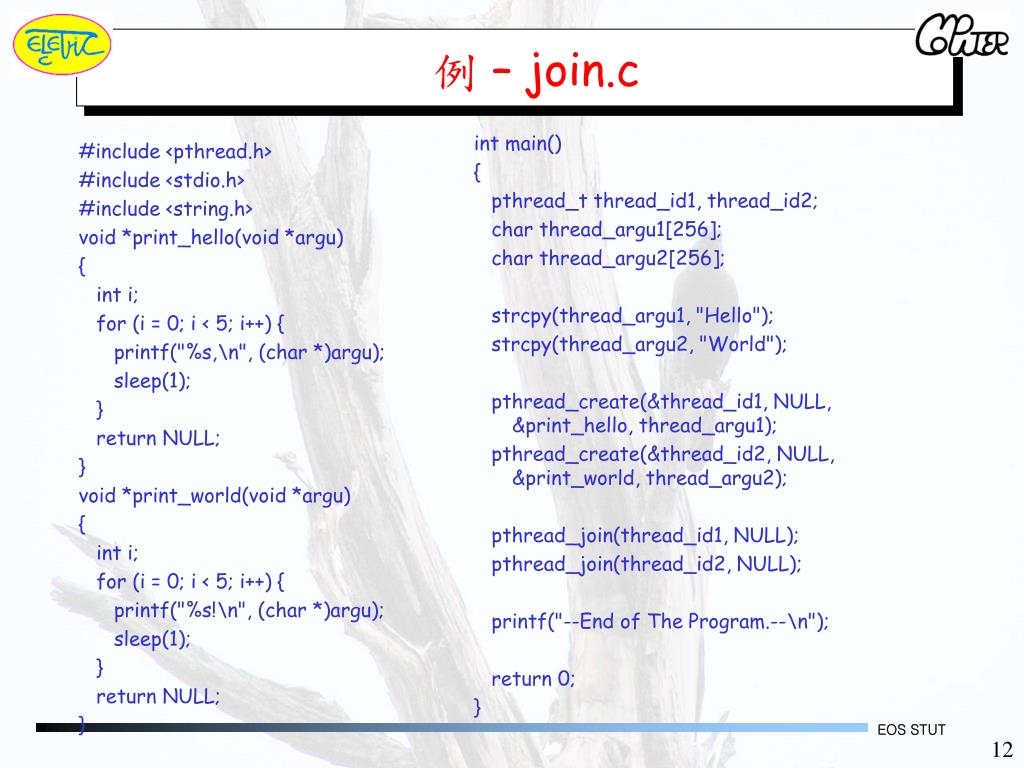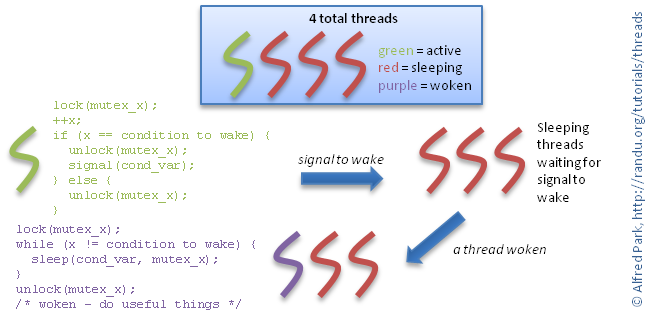

Join And Cancel Pthread C How To Compare Two
(0 Replies)Notes: (1) If thread has already terminated then pthreadjoin() will return immediately. A non-detached thread must be joined will stay a zombie.In the part-II (Thread creation and Identification) of the Linux Thread series, we discussed about thread IDs, how to compare two thread IDs and how to create a thread.Hi, I would like to know if the call of pthreadjoin( thread,&status) for a thread already created in main function will free the memory allocated to thread after the pthreadjoin retruns or should I wait the termination of main function Is there any need to cancel or exit the thread if I. Learn to implement data structures like Heap, Stacks, Linked List and many moreThe thread will be joinable (from another pthread), unless attr tells to create the thread detached.
Join And Cancel Pthread C Code Above And
C Thread Example ProgramIf we take the same example as discussed in part-II of this series : #includeErr = pthread_create(&(tid), NULL, &doSomeThing, NULL) Printf("\ncan't create thread :", strerror(err)) Printf("\n Thread created successfully\n") Did you observe the ‘sleep()’ function being used? Did you get a question about why sleep() is being used? Well if you did then you are at the correct place to get the answer and if you did not then also its going to be a good read ahead.If I remove the sleep() function from the code above and then try to compile and run it, I see the following output : $. Ti/posix/freertos/pthreadcond.c ti/posix/freertos/pthread.c.Linux Threads Series: part 1, part 2, part 3 (this article). Contributions to the POSIX implementation come from the compiler, the C run-time library. Pthreadcancel() returns zero after completing successfully. Pthreadcancel Return Values. Two functions, pthreadsetcancelstate(3C) and pthreadsetcanceltype(3C), determine that state.
#include Int pthread_join(pthread_t thread, void **rval_ptr) The function above makes sure that its parent thread does not terminate until it is done. So, if we want that the main thread should wait until all the other threads are finished then there is a function pthread_join(). So maximum lifetime of every thread executing in the program is that of the main thread. Thread TerminationAs already discussed above that each program starts with at least one thread which is the thread in which main() function is executed. This means that the default thread in which the main() function was running got completed and hence the process terminated as main() returned. /threadsSo we see that the log ‘Second thread processing’ is missing in case we remove the sleep() function.So, why does this happen? Well, this happened because just before the second thread is about to be scheduled, the parent thread (from which the two threads were created) completed its execution.
If it is canceled by some other thread. If the thread returns from its start routine. If we are not interested in the return value then we can set this pointer to be NULL.If we classify on a broader level, then we see that a thread can terminate in three ways :

The start function for both the threads is same ie doSomeThing() We created two threads using pthread_create() C Thread Termination ExampleLets take an example where we use the above discussed functions : #includePrintf("\n First thread processing done\n") Printf("\n Second thread processing done\n") Printf("\n return value from first thread is \n", *ptr) Printf("\n return value from second thread is \n", *ptr)
/threadsSo we see that both the threads execute completely and their return value is accessed in the main function. Once both the threads are complete, their return value is accessed by the second argument in the pthread_join() call.The output of the above code comes out as : $. In the main function after the threads are created, the pthread_join() functions are called to wait for the two threads to complete.


 0 kommentar(er)
0 kommentar(er)
